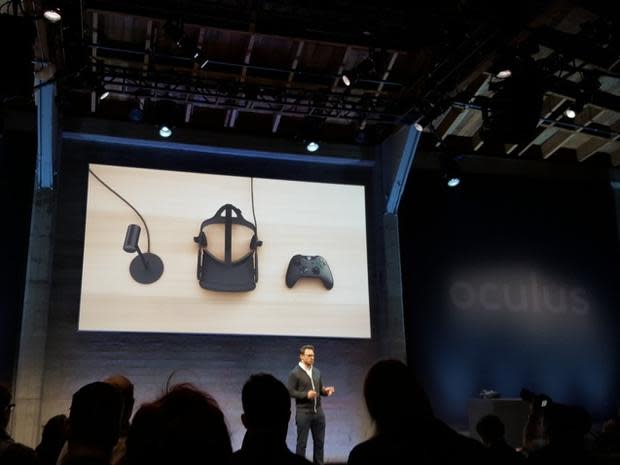Oculus defines its VR journey: Unveils consumer Rift, VR content, Microsoft partnership
This article, Oculus defines its VR journey: Unveils consumer Rift, VR content, Microsoft partnership, originally appeared on TechRepublic.com.

Image: Erin Carson/TechRepublic
Oculus wants you to believe something--they're making dreams come true.
That was the story they told at their first press event for the long-anticipated consumer version of the Rift--referred to as "CV1" -- set for release in Q1 of 2016. The event, which preceded E3 by a week, was held Dogpatch Studios in San Francisco on Thursday.
The basic rundown of the newly unveiled Rift is this: The head mounted display is covered in fabric and includes a desk-mounted sensor. The display itself is two OLED screens. It can accommodate for glasses, and has a dial to adjust the distance between the lenses. It also has an integrated audio system that's detachable, for users who prefer their own headphones. CEO Brendan Iribe also talked about designing the strap so the HMD doesn't pull on the user's face.
"You put it on like a baseball cap," he said.
SEE: Why virtual reality could finally mend its broken promise
From there, Iribe brought out Phil Spencer, head of Xbox to announce not only that the Rift will be compatible with the Xbox One wireless controller, but that Oculus has forged a partnership with Microsoft that will bring Xbox One games to the Rift. That could help bolster content going into the first year, given that Xbox One is battling Sony PlayStation 4 for the top spot as the world's best selling game console.
The Rift will also work natively with Windows 10.
Gartner analyst Brian Blau said he wasn't surprised by the Microsoft partnership, since Microsoft has had a good relationship with Facebook other the years.
"That said, you'd hope Oculus wouldn't limit itself just in being a partner with Xbox. If they are going to truly support games, I think it would benefit the game community if they're more open. And I'm sure they will be," he said.
Oculus next brought out several indie game companies to talk about some of the launch titles consumers can expect next year. Then, the Facebook-owned company announced a $10 million-dollar investment in indie game developers.
"Investment into indie development is a fantastic initiative, and I hope it continues," said ABI research analyst Eric Abbruzzese.
Though, Blau said that in context of what gets spent on game development, $10 million might not be that much.
Essentially, it all made for a large swath of the event devoted to gaming content.
"[This] really isn't worth that much unless there's incredible content," Iribe said.
The Oculus team knows how crucial content will be to adoption. After the newness wears off, there has to be a solid reason for users to stay. The partnership with Microsoft which will make Xbox One games streamable to the Rift makes sense because they'll gain access to an audience that already exists and is already engaged.
As far as where much of this content will live, the answer is Oculus Home, an interface that users will see immediately when they put on the Rift. Think something similar to what happens when you put on a Samsung Gear VR and you're standing inside a beachfront house with a visual menu floating in front you. That's the home screen for a user's VR content library.

Image: Erin Carson/TechRepublic
Another piece of Oculus Home is a social component that runs along the side which shows a user what his or her friends are playing.
One of the bigger questions going into the event was that of inputs -- the idea being that Oculus needs to disclose what those inputs will be so that developers can get to work. Early in the press event, Iribe said that the Rift will be compatible with the Xbox One controller.
Then, toward the end, Iribe brought out Oculus co-founder Palmer Luckey--decked out in a gray blazer and flip flops--for an Apple-esque "one more thing" moment.
Luckey talked about the inevitable evolution of inputs and introduced technology called Oculus Touch in the form of the "Half Moon" controllers, which are two mostly circular handheld controllers.
There are a few concepts that go into these controllers -- hand presence, the ability to easily manipulate objects, "low mental load" (users shouldn't have to think about the controllers too much), haptics, finger pose recognition, and minimal weight.
They won't be available immediately, but Oculus will be giving demos at E3.
What is interesting about the narrative that Oculus tells is that it's heavily weighted toward the idea that the consumer version in itself is the fulfillment of decades of mostly fruitless ramping up toward virtual reality. Meanwhile, the Half Moon controllers might have been the biggest acknowledgment that the CV1 is one dot in a long spectrum and not an endpoint.
"Things have come so far, so fast," Luckey told the crowd, "This isn't science fiction, this is reality, and it's happening today."
Oculus is an impossible-to-ignore giant in the progression of this industry, and they know it.
"Oculus has been the main story around VR since 2011 when Palmer Luckey first had his Kickstarter, and I think today we're seeing the realization of that, the realization of his dream and what he set out to do," Blau said.
Other questions still remaining are how much the Rift will cost and when it will open for pre-orders--more specific than the current end-of-year time frame--as well as any other launch titles that may be announced at E3 in Los Angeles, June 16-18.

